

When Should We Lecture? October 1, 2014 By: Maryellen Weimer, PhD in Teaching Professor Blog There are purists among us who would say that we should never lecture, but I don’t think that’s terribly realistic, and I’m still not ready to totally rule out lectures.
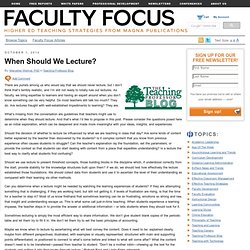
As faculty, we bring expertise to learners and having an expert around when you don’t know something can be very helpful. Do most teachers still talk too much? They do. What’s missing from the conversation are guidelines that teachers might use to determine when they should lecture. Should the decision of whether to lecture be influenced by what we are teaching in class that day? Should we use lecture to present threshold concepts, those building blocks in the discipline which, if understood correctly from the start, provide stability for the knowledge structures built upon them?
Parents Of Nasal Learners Demand Odor-Based Curriculum. COLUMBUS, OH–Backed by olfactory-education experts, parents of nasal learners are demanding that U.S. public schools provide odor-based curricula for their academically struggling children. Enlarge Image A nasal learner struggles with an odorless textbook. "Despite the proliferation of countless scholastic tests intended to identify children with special needs, the challenges facing nasal learners continue to be ignored," said Delia Weber, president of Parents Of Nasal Learners, at the group's annual conference.
"Every day, I witness firsthand my son Austin's struggle to succeed in a school environment that recognizes the needs of visual, auditory, tactile, and kinesthetic learners but not him. " Weber said she was at her "wit's end" trying to understand why her son was floundering in school when, in May 1997, another parent referred her to the Nasal Learning Research Institute in Columbus.
"My child is stupid," Weber said. Austin's experience is not unique. However, according to Dr. Learning Styles: Fact and Fiction – A Conference Report. By Derek Bruff, CFT Assistant Director Back in November I attended the 30th annual Lilly Conference on College Teaching at Miami University in Ohio.
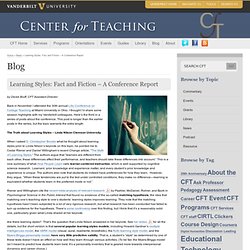
I thought I’d share some session highlights with my Vanderbilt colleagues. Here’s the third in a series of posts about the conference. This post is longer than the earlier posts in the series, but the topic warrants the extra length. Matching Teaching Style to Learning Style May Not Help Students - Teaching. By David Glenn.
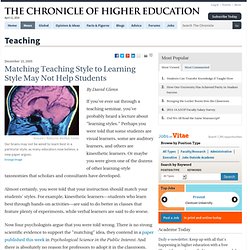
Learning Styles Debunked: There is No Evidence Supporting Auditory and Visual Learning, Psychologists Say. News Are you a verbal learner or a visual learner?
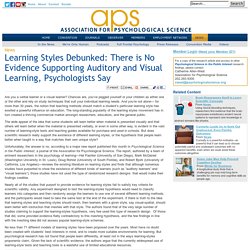
Chances are, you’ve pegged yourself or your children as either one or the other and rely on study techniques that suit your individual learning needs. And you’re not alone— for more than 30 years, the notion that teaching methods should match a student’s particular learning style has exerted a powerful influence on education. The long-standing popularity of the learning styles movement has in turn created a thriving commercial market amongst researchers, educators, and the general public. The wide appeal of the idea that some students will learn better when material is presented visually and that others will learn better when the material is presented verbally, or even in some other way, is evident in the vast number of learning-style tests and teaching guides available for purchase and used in schools.
Nearly all of the studies that purport to provide evidence for learning styles fail to satisfy key criteria for scientific validity. Change Magazine - September-October 2010. By Cedar Riener and Daniel Willingham There is no credible evidence that learning styles exist.
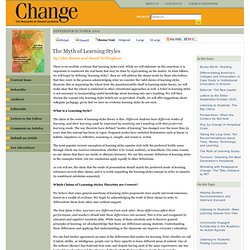
While we will elaborate on this assertion, it is important to counteract the real harm that may be done by equivocating on the matter. 10 Do’s and don’ts to using PowerPoint to deliver lectures that don’t suck. Four things lecture is good for - Casting Out Nines. A lot of my posts here are about alternatives to the traditional lecture-oriented classroom.
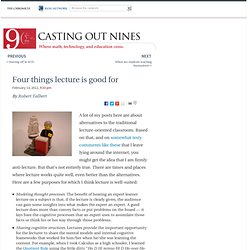
Based on that, and on somewhat testy comments like these that I leave lying around the internet, you might get the idea that I am firmly anti-lecture. But that’s not entirely true. There are times and places where lecture works quite well, even better than the alternatives. The lecture. I recently wrote that Understanding by Design is agnostic about any specific method or pedagogy. The bottom-line question has to do with validity: given the goals, what follows? Thus, it makes little sense to say “I never lecture” or “I always do authentic assessments” as if it were a question of ideology or personal taste. As educators, we should use the methods that best work to achieve our goals. To that end, let’s consider as dispassionately as possible the oldest instructional method in formal education: the lecture. (By “lecture” I mean the typical HS and college class in which a Professor or teacher speaks for most of the period.) As the etymology of the word suggests, the original lectures were readings.
What could not be more obvious as efficient pedagogy? A deeper look at pedagogical purpose. Here are a few commonly-given reasons for lecturing: Students need to know core information. There are times and places where lecture works quite well, even better than the alternatives.